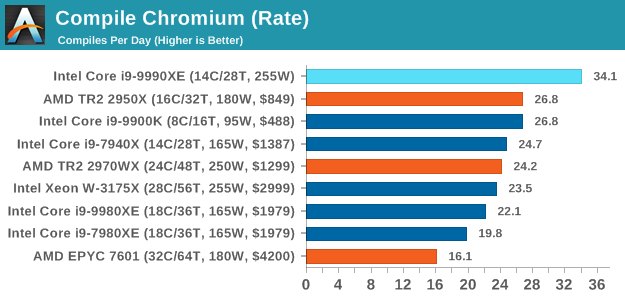The Intel Core i9-9990XE Review: All 14 Cores at 5.0 GHz
by Dr. Ian Cutress on October 28, 2019 10:00 AM ESTChromium Compile: Windows VC++ Compile of Chrome
A large number of AnandTech readers are software engineers, looking at how the hardware they use performs. While compiling a Linux kernel is ‘standard’ for the reviewers who often compile, our test is a little more varied – we are using the windows instructions to compile Chrome, specifically a Chrome 56 build from March 2017, as that was when we built the test. Google quite handily gives instructions on how to compile with Windows, along with a 400k file download for the repo. This is by far one of our most popular benchmarks, and is a good measure of core performance, multithreading performance, and also memory accesses.
In our test, using Google’s instructions, we use the MSVC compiler and ninja developer tools to manage the compile. As you may expect, the benchmark is variably threaded, with a mix of DRAM requirements that benefit from faster caches. Data procured in our test is the time taken for the compile, which we convert into compiles per day. The benchmark takes anywhere from an hour on a fast single high-end desktop processor to several hours on the slowest offerings.

Prior to this test, the two CPUs battling it out for supremacy were the 16-core Ryzen Threadripper 2950X, and the 8-core i9-9900K. By adding six more cores, a lot more frequency, and two more memory channels, the Core i9-9990XE plows through this test very easily, perfoming the compile in 42 minutes and 10 seconds, and is the only processor to broach the 50 minute mark, let alone the 45 minute mark.










145 Comments
View All Comments
DazFG - Tuesday, October 29, 2019 - link
Would like to see a average performance/Watt chart.abufrejoval - Tuesday, October 29, 2019 - link
The older 3Dmark physics tests don't scale to all available processor cores, so those numbers are misleading. My observation has been that the newer/more demanding the base benchmark, the wider the physics. So e.g. I doubt that Ice Storm actually scores beyond 4 physical cores, while I have seen the physics benchmark correllating to the DX12 graphics (keep forgetting the name) actually pushed all 18 cores in my workstation. I run HWinfo on a secondary screen to monitor what's happening on the system and it cleary reflects that most cores aren't used on these CPU-only physics tests.abufrejoval - Tuesday, October 29, 2019 - link
1.290V at 5 GHz all core may be "amazing" but it should really be "expected": Any chip that requires more voltage and thus power to push electrons through layer interconnects will fail the binning because of heat. And with every little part of 14 cores and their caches needing to qualify, it's easy to see how rare these are.DixonSoftwareSolutions - Tuesday, October 29, 2019 - link
I'm still holding out for the i9-9999XE.Hifihedgehog - Tuesday, October 29, 2019 - link
Agreeing to disagree with you, Ian, after seeing the benchmark results, I would hardly call this the slam dunk and beast it is made out to be. It is good in several benchmarks but it is highly specialized to the point I would argue the 9900KS would be the better choice of the two in nearly all cases for high frequency applications and the 3900X (and by extension 3950X) in multi-core applications. All in all, I am not really impressed and even less so with Threadripper 3000 and Cascade Lake on the verge of release.lejeczek - Tuesday, October 29, 2019 - link
Who cares about tests done on Windows? Who would bother with Chrome compilation on Windows?? Author(s) sees that increasingly more tests are being done with Open Source and clumsily tries to mimic that. But for those interested in real testing - go to phoronix.com and openbenchmarking.orgLots love, xxx.
Urufu - Tuesday, October 29, 2019 - link
Not interested because that's not the real world that people experience every day when using these microprocessors. My apologies for seeming abrupt.lejeczek - Thursday, October 31, 2019 - link
This certainly will sound abrupt - it's for that tiny little world and tiny people in it - the office?? Step outside for a moment and look at big data, clusters, HPC, all sort of servers & services, also academia! Linux & open source everywhere. Why?Might think... some media streaming, transcoding, codecs, etc. you might need that i9-9990XE beast in the office and for windows - sure if you click once here once there to run something - heavy duty transcoding that's Linux all around the clock.
But if one does only pure 'office' and thinks s/he must have this i9-9990XE - well these are the same sort of people who even today when it makes no financial sense whatsoever(do not mention this is not 'office' cpu), who have been happy to pay hefty taxes to Intel for years, those people will do it anyway, will waste money on it, as they do with anything else I'm sure.
But anyway, 'the office' stuff also we do with Linux, easy.
TEAMSWITCHER - Wednesday, October 30, 2019 - link
There is still a metric-sh*t-ton of software development that happens on Windows.MattZN - Tuesday, October 29, 2019 - link
Did you say 600W under full load? For a single CPU socket and only 14 cores? That isn't a wattage that will beget a limited market. That's a wattage that makes the chip D.O.A. No market. At all. Anywhere. Not for 'high frequency trading' or anything else.-Matt